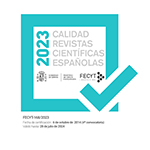La movilidad de los objetos tecnocientíficos: un ejemplo de biopolítica a través de las patentes
Resumen
Hasta ahora la mayoría de estudios sobre movilidad y/o biopolítica se han centrado en la gestión política de los sujetos (flujos migratorios, instituciones de control, turismo internacional, gubernamentalidad de los procesos globales, etc.). Por una parte, el paradigma de la movilidad (Urry y la escuela de Lancaster) ha abordado un abanico disperso e inconexo de fenómenos móviles introduciendo tímidamente las cuestiones del poder. De otra, las reflexiones biopolíticas contemporáneas en el seno de las Ciencias Sociales han operado siempre con sujetos de carne y hueso excluyendo de sus reflexiones el mundo de los objetos (tal y como reclamaría la Teoría del Actor-Red y otras miradas sociológicas). En este artículo se intenta esbozar un marco de comprensión de procesos biopolíticos relacionados con la movilidad de ciertos objetos o redes de objetos/sujetos; en concreto a través de los títulos de propiedad ad hoc sobre objetos tecnocientíficos, las patentes. Gracias a ciertos acontecimientos históricos de finales del siglo XIX y principios del siglo XX se va construyendo un entramado patentista internacional (exposiciones mundiales, tratados bilaterales, acuerdos continentales, etc.), que junto con determinados elementos actuales relacionados con la globalización de las propiedades inmateriales tecnocientíficas (acuerdos TRIPs y similares en el caso biotecnológico o agroalimentario), servirán como ejemplos o estudios de caso para ilustrar la dinámica biopolítica generada por la movilidad estratégica de objetos científicos y tecnológicos (producto de un régimen de apropiación basado en títulos internacionales sobre genes, fórmulas químicas, biomasa, especies vegetales o animales, alimentos, transgénicos, etc.).Descargas
Licencia
La revista Política y Sociedad, para fomentar el intercambio global del conocimiento, facilita el acceso sin restricciones a sus contenidos desde el momento de su publicación en la presente edición electrónica, y por eso es una revista de acceso abierto. Los originales publicados en esta revista son propiedad de la Universidad Complutense de Madrid y es obligatorio citar su procedencia en cualquier reproducción total o parcial. Todos los contenidos se distribuyen bajo una licencia de uso y distribución Creative Commons Reconocimiento 4.0 (CC BY 4.0). Esta circunstancia ha de hacerse constar expresamente de esta forma cuando sea necesario. Puede consultar la versión informativa y el texto legal de la licencia.











